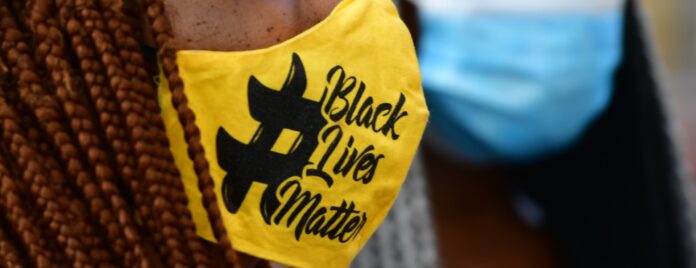Former employees of
are fighting a federal judge’s order dismissing their claims that the grocer and its parent company unlawfully fired them for wearing “Black Lives Matter” face masks.
The three plaintiffs will assert during oral argument Tuesday in the US Court of Appeals for the First Circuit that Whole Foods discriminated against them and a class of workers for engaging in protected activity under federal anti-discrimination and labor law by protesting the company’s ban on Black Lives Matter apparel.
Under Whole Foods’ dress code, employees can’t wear clothing with writing on it that doesn’t promote the store. When employees had to wear masks to work during the Covid-19 pandemic, the company began to strictly enforce the rule.
The former employees were sent home multiple times for wearing masks displaying the words “Black Lives Matter” when managers instructed them not to. They filed discrimination and retaliation charges with the Equal Employment Opportunity Commission and the National Labor Relations Board, and continued to wear the masks.
When they received enough disciplinary points under Whole Foods’ attendance policy, they were fired.
Judge Allison D. Burroughs of the US District Court for the District of Massachusetts
ruled in January
that the workers had engaged in protected activity by continuing to wear the masks, but found there wasn’t enough evidence to prove that their firings amounted to illegal retaliation.
The appeal gives lead plaintiff Savannah Kinzer another opportunity to prove that Whole Foods and Amazon violated Title VII of the 1964 Civil Rights Act and the National Labor Relations Act by banning BLM apparel and firing several workers. She was part of another
class action
against the grocer in 2020, alleging that their firings violated Title VII. The First Circuit
dismissed
that case last year.
The Kinzer case is the latest of several that have addressed the issue of civil rights apparel in the workplace after the 2020 murder of George Floyd reinvigorated the Black Lives Matter movement.
National Labor Relations Board General Counsel Jennifer Abruzzo has openly supported BLM efforts in the workplace, pursuing complaints against companies like
Whole Foods
and
Home Depot. Abruzzo said she believes workers protesting civil rights issues in the workplace are engaged in “inherently concerted” activity and should be protected under federal labor law.
In August, the NLRB also
restored protections
for employees who advocate on behalf of independent contractors and other individuals not covered by the NLRA.
Dress Code Violation?
Whole Foods
argued
that the workers’ protected activity began after Kinzer had already accumulated enough disciplinary points to be terminated. But company records indicate it didn’t fire her until after she told them she had filed a complaint with the EEOC, Kinzer’s attorney, Shannon Liss-Riordan of Lichten & Liss-Riordan PC, said in her
appellate brief, calling the dress code a “pretext” for the firings.
Another plaintiff, Haley Evans, said she wasn’t terminated for wearing a BLM mask until after she conducted media interviews protesting the ban, filed her own EEOC complaint, and joined a class action against the company.
Whole Foods and the district court ignored a “mountain of evidence” showing that company executives knew which workers were protesting the ban and fired them because of those activities. Records also show that Kinzer’s store manager waited to get approval from “top brass” before firing her, according to the brief.
“Senior corporate leadership’s unusual involvement in these terminations, their characterization of Ms. Kinzer as an ‘agitator,’ and their discussion of her pursuit of legal claims for discrimination, all create a genuine dispute over material facts as to whether Whole Foods’ rationale for terminating Plaintiffs was pretextual and impermissibly retaliatory,” the brief said.
But Whole Foods said in its brief that the company has maintained a consistent strategy for handling dress-code violations and didn’t single out Kinzer or the other plaintiffs for wearing BLM face masks.
The company’s disciplinary actions were all determined before officials were aware of the workers’ lawsuits and EEOC complaints, Whole Foods said in its brief.
“Employers are not required to suspend previously planned employment actions upon discovering that a Title VII suit has been filed, and their proceeding along lines previously contemplated, though not yet definitively determined, is no evidence whatever of causality,” Whole Foods argued.
Discovery Dispute
Kinzer is also asking the First Circuit to rescind a lower court order for her to hand over communications among the Whole Foods employees. The requested text messages show coordination between the workers over litigation surrounding their firings and ongoing protests at the stores.
Kinzer and the NLRB—which filed an amicus brief in the case—both argue that this order infringes upon the workers’ rights under Section 7 of the NLRA. “It is ‘well settled’ that the Act provides a right to confidentiality in Section 7 protected activity, a right which the Board zealously seeks to protect,” the NLRB said in
its brief.
Whole Foods argued that Kinzer and the other workers weren’t planning to unionize, so their communication isn’t protected under federal labor law. But the NLRB asserted that federal labor law applies to both union and nonunion workers as well as activity that isn’t related to unionization.
Whole Foods’ attorney, Michael Banks of Morgan Lewis & Bockius LLP, didn’t respond to requests for comment.
The case is
Kinzer v. Whole Foods Market, Inc., 1st Cir., No. 23-01100, oral argument scheduled 12/5/23.
